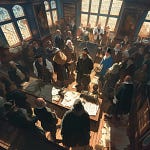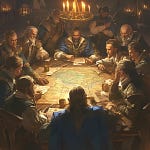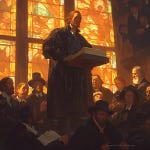The Simple Puritan Cobbler of Aggawam, Illuminated Commentary, Essential, Interconnected.
“With the close of the Civil War we enter on a time of confused struggles, a time tedious and uninteresting in its outer details, but of higher interest than even the war itself in its bearing on our history. Modern England, the England among whose thoughts and sentiments we actually live, began, however dimly and darkly, with the triumph at Naseby. Old things passed silently away. When Astley gave up his sword the "work" of the generations which had struggled for Protestantism against Catholicism, for public liberty against absolute rule, in his own emphatic phrase, was "done." So far as these contests were concerned, however the later Stuarts might strive to revive them, England could safely "go to play." English religion was never to be more in danger. English liberty was never to be really in peril from the efforts of kings after a personal rule. Whatever reaction might come about, it would never bring into question the great constitutional results that the Long Parliament had wrought. But with the end of this older work a new work began. The constitutional and ecclesiastical problems which still in one shape or another beset us started to the front as subjects of national debate in the years between the close of the Civil War and the death of the King. The great parties which have ever since divided the social, the political, and the religious life of England, whether as Independents and Presbyterians, as Whigs and Tores, as Conservatives and Liberals, sprang into organized existence in the contest between the Army and the Parliament. Then for the first time began a struggle which is far from having ended yet, the struggle between political tradition and political progress, between the principle of religious conformity and the principle of religious freedom.”
~ John Richard Green, History of the English People, Volume III: Puritan England 1603-1660, The Revolution 1660-1688 (1882), p. 245-246
Here is an Excellent Supplement by Carl Holliday, which argues that The Simple Cobbler of Aggawam is America’s First-ever Satirical work. If so, Nathaniel Ward is, therefore, America’s First-ever Satirist.
Happy Reading!
Your support is vital for this Mammoth undertaking & endeavour!
If this project interests you, I would greatly appreciate it if you subscribed to a Monthly/Yearly pledge to support my work so that I can provide you, Dear Listeners, with Top-quality material.
Come & join me to explore & study US History as it ought to be: in the words of the peoples of the time themselves!
Alternatively, you can tip here:
Thank You, Dear Listeners, for all your support!
















Share this post